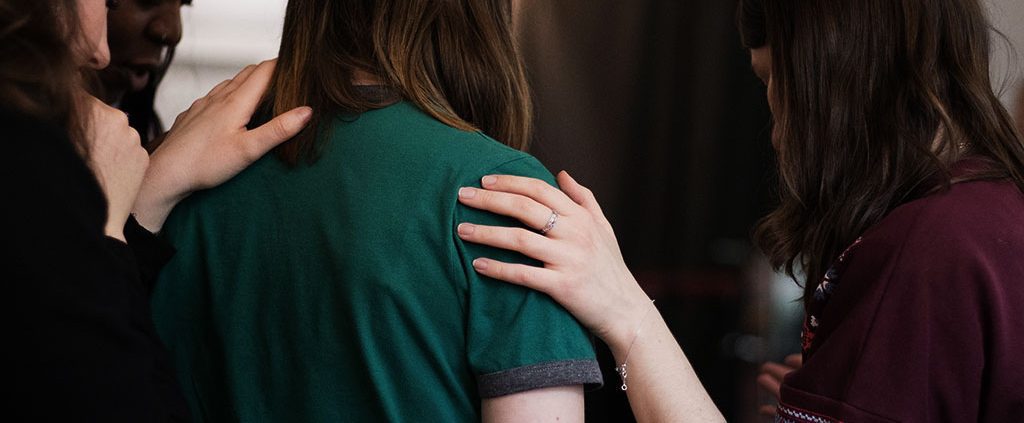When “I’m Praying For You” Feels Hollow
Written by Christine E., USA
Have you ever watched a friend go through something you really can’t help them with?
I have a good friend who struggles with a slew of health problems. The best I can do is hug her and tell her that God is in control—whatever comfort that may be. She also struggles with finances. Her family does not have steady income. I have no idea how they pay the medical bills.
Now that I have moved half a world away, I can’t even hug her when she’s having a bad day. Seemingly the only thing I can do is tell her, “I’m praying for you.”
Does that ever feel hollow to you? Sometimes it does to me. I say “I’m praying for you” when there’s nothing else I can do.
But I am learning to remind myself that, praying for someone is actually the best thing I can do for them. After all, by praying I bring my needs and my friends’ needs before our all-powerful God. Seeking God’s intervention in someone’s life—surely that’s more effective than dinners or hugs!
As I practice praying for others, I increasingly realize that prayer is not the easy way out.
When Jesus prayed before His death, “his sweat was like drops of blood falling to the ground” (Luke 22:44). When Paul wrote to the church in Rome, he asked them to “join me in my struggle by praying to God for me” (Romans 15:30, emphasis added).
Prayer can be a struggle. Our first instinct when faced with brokenness in the world is to do something about it, not spend hours in a quiet room tearfully petitioning God. Both are necessary, but it’s so easy to forget which one is more effective.
As I learn more about prayer, I am more and more convinced that praying is really the best thing we can do in any circumstance.
In prayer, I acknowledge my helplessness
When a friend is going through a difficult time, I want to help. I might offer to spend time with them. I might run errands or cook dinner or offer some other practical help. At the very least, I might send a short text telling them I’m thinking of them.
Sometimes I try to fix their problems—I give my friends’ the right books to read, spend hours talking about their troubles, offer all the usual platitudes. . . But while it is important to love our friends and walk with them through difficult times, I need to realize that I can’t fix my friends’ problems. On my own, I can’t help them recover from break-ups, heal from a death in the family, or be restored to health.
That’s why I pray—I need to acknowledge my utter inability to help my friends or myself. I might have good intentions, but the fact is, I am not the healer. When I pray, I acknowledge that God will heal my friends in His own time, in His own way. My responsibility is to love them and walk with them. The rest I need to leave up to God, who is much better at these things than I am.
In prayer, I acknowledge God’s sovereignty
God is sovereign. Nothing happens without His permission (Matthew 10:29). When bad things happen in our lives or the lives of our friends, we need to recognize that God is working. We pray and trust in God’s promise that “in all things God works for the good of those who love him” (Romans 8:28). When faced with the meaninglessness of tragedy, we pray and profess our belief in the goodness of God even as our hearts are broken to pieces.
When a friend is diagnosed with a fatal illness, or when a young mother experiences a miscarriage, or when a child dies meaninglessly in a car accident. . . Honestly, is there anything we can do to make those circumstances easier to bear? We try our best by offering our presence and our shared grief. But the fact that Christ has given us hope beyond this life (1 Corinthians 15:13-14) brings purpose to our suffering.
It’s not easy to acknowledge God’s sovereignty when things do not go our way. It’s not easy to believe His goodness when our lives are falling apart. But that’s why we pray. We pray even when we cry out in doubt and pain, and we pray ourselves to a point where we trust that somehow, someway, our God will yet make something good out of our broken lives.
In prayer, I learn how best to help those around me
When I pray for someone, I learn to see them through God’s eyes. Prayer is not just me talking to a dark room, it is me talking to God! When I pray sincerely, I am bringing my petitions to an almighty God, and trusting that He will respond.
I often start my prayers by asking God to help me pray. You see, I don’t always know how best to pray for someone. If left to my own devices, my prayers would probably look something like a Christmas wishlist: “Recovery,” “financial provision,” “wise doctors,” etc. There is nothing specifically wrong with that, but it’s not exactly a meaningful or productive conversation with the Almighty. God has promised help for when we don’t know how to pray (Romans 8:26), so I make full use of that promise by asking for help.
Then, knowing God is not only listening, but likely guiding me in my prayers, I start petitioning Him. So often I rely on God’s love—God loves my friends and family so much more and so deeply than I could ever imagine. He knows all their needs, great and small. As I increasingly realize this, I find myself praying less for physical healing or for financial provisions, but praying more for God to give real comfort, for God to remind my friends and I that He is in control, for God to show supernatural provision in their circumstances (whatever that may look like). When I am reminded how much God loves my friends—that He laid His life down for them!—I can pray with confidence that God’s will be done.
As a result, I believe that God works through my prayers. When I open my heart in prayer, I learn how to love a fellow image bearer the way God loves them, and am more likely to respond in a godly manner when the need arises.
While I long to solve the circumstantial difficulties people around me face, I’m reminded through praying that this is the best thing I can do for them.
Our world is fallen. We are reminded of this every time we turn on the news. We are reminded of this every time our loved ones suffer for one reason or another. Whenever we feel overwhelmed by the brokenness of the world around us, let’s remember this: Only God can offer peace that surpasses understanding. Only He will ultimately wipe away every tear. And when we pray, we call on God’s promises—and take comfort in the knowledge that whatever the circumstance, His purposes will be accomplished in our lives (Isaiah 46:10).
“Let us then approach God’s throne of grace with confidence, so that we may receive mercy and find grace to help us in our time of need.” (Hebrews 4:16)










I’ve always had a difficult time empathizing with other people and putting my place into their shoes. I wanted to learn how to love people and how I can help them. I wanted to become an answered prayer all of these are so true. Thanks for sharing, this helps me understand better the power of prayer and how I can help ❤❤